What Do I Put on a Job Application If My Previous Employer Is out of Business?
by Morgan Rush
Published on 26 Sep 2017
Businesses close their doors all the time. Perhaps your previous employer ran out of funds, lost interest in the field, sold the company to a competitor or retired to the Caribbean. No matter the reason, listing a previous employer on a job application can create a tricky situation. The wrong wording might indicate that you left the business for other reasons. Follow a simple format to ensure that readers clearly understand that the business closed rather than wondering if you were fired or left voluntarily.
Listing previous employers on job applications helps demonstrate prior work experience. It also accounts for your time, demonstrating that you’ve maintained a regular work history without worrisome gaps. Not listing a previous employer on your job application is a mistake because it looks like you weren’t working during that particular time period — potential employers may wonder what you were doing during that unaccounted-for time. Indicating that the previous employer went out of business explains your reason for leaving, so that potential employers don’t wonder if you quit inexplicably or were fired.
To list your previous employer on a job application, follow the same format provided on the job application for other prior work experience. Include job title, company name, dates worked, job responsibilities and salary, if applicable. After providing that information, write “no longer in business,” “ceased operations,” or “defunct.” If your previous employer is out of business because he sold the company to a respected competitor, capitalize on name recognition by indicating that the business was sold to a particular company. For example, write, “ABC Computers (Now Microsoft Corp.).”
Some job applicants might be skittish about listing an out-of-business employer on a job application, fearing that this reflects negatively on individual work performance. Prospective employers are unlikely to assign blame for the company closure, especially if your position had little to do with management or finances. Rarely do businesses fail because of one particular employee, so identifying your previous employer as having closed for business doesn’t negatively impact your work experience. Don’t go into the "juicy details" if you are invited to a job interview after submitting an application; your prospective employer will note your professionalism and sensitivity.
If your previous employer went out of business but you’ve remained in contact with him, it’s still fine to list contact information on the job application, if requested. Always ask permission from the previous boss before doing so; this gives her time to prepare a statement about your contributions.
- Get the Job
- Resumes and CVs
- Applications
- Cover Letters
- Professional References

Professional Licenses and Exams
- Get a Promotion
- Negotiation
- Professional Ethics
- Professionalism
- Dealing with Coworkers
- Dealing with Bosses
Communication Skills
Managing the office, disabilities, harassment and discrimination, unemployment.
- Career Paths
- Compare Careers
- Switching Careers
- Training and Certifications
- Start a Company
- Internships and Apprenticeships
- Entry Level Jobs
- College Degrees
Growth Trends for Related Jobs
What can you say on your application for when a business closed down.

When potential employers ask you to list your reason for leaving a previous job, they're looking for red flags like being fired. But being laid off due to a business closing does not make you look bad. When filling out your job application, honesty is the best policy in this case.
What to Write
When a job application has a space that asks your reason for leaving, the best response is to simply write "company closed" if that's the case. You don't need to go into any greater detail such as explaining why the company closed. This simple explanation shows the potential employer that you lost your job through no fault of your own. Only use this reason if it's the truth, however. If you left for other reasons prior to the closure, you should be truthful.
Related Articles
What to put on a job application if you're forced to resign →.

Should I Wear Dress Clothes to Turn in a Job Application? →

How to Address a Job Application Envelope →

How to Dress for a Minimum Wage Job Interview →

How to Fill Out a Job Application When Fired From Your Last Job →

How to Write a Response to an Interview Request →

- Iowa Workforce Development: Questions About Job Applications
M. Scilly is a writer and editor who writes for various online publications, specializing in business and management. He has a fondness for travel and photography. In his free time he enjoys marathon training.
Methagob/iStock/GettyImages
- Job Descriptions
- Law Enforcement Job Descriptions
- Administrative Job Descriptions
- Healthcare Job Descriptions
- Sales Job Descriptions
- Fashion Job Descriptions
- Education Job Descriptions
- Salary Insights
- Journalism Salaries
- Healthcare Salaries
- Military Salaries
- Engineering Salaries
- Teaching Salaries
- Accessibility
- Privacy Notice
- Cookie Notice
- Copyright Policy
- Contact Us
- Find a Job
- Manage Preferences
- California Notice of Collection
- Terms of Use
Stack Exchange Network
Stack Exchange network consists of 183 Q&A communities including Stack Overflow , the largest, most trusted online community for developers to learn, share their knowledge, and build their careers.
Q&A for work
Connect and share knowledge within a single location that is structured and easy to search.
How to present a job where the company was bought out while you worked there? [duplicate]
I'm working on updating my resume and came across this issue. The company I work at was bought out almost a year ago, while I continued working there during that time. To further clarify, timeline would be something like:
- 1 year at Company X
- Company X bought out by Company Y
- 1 more year at Company Y
How should I include this experience on my resume? Should I format it as 2 jobs? If not, which company name should I label it with?
- work-experience
4 Answers 4
I have seen this simply listed as "2 years at Company Y (formerly Company X)". If your role or responsibilities significantly changed between these companies then possibly they should be listed separately or explain the situation in your cover lever if it relates to the position you are applying to.
If you performed the same tasks, I would go for simplicity and keep it a single line
- 1/11/2001 - 30/10/2003: Janitor work at Company X (Company Y since 30/10/2012)
I'd use the current name of the company so if the future employer wants to look them up or contact them it is easier. I'd add a footnote to the end of that job description saying something like:
Note: Position originally with company Y, which was purchased by company X on DATE
I say put this at the end, because it doesn't need to pollute the basic information of the employment dates, job title, and company name that should dominate the start of the listing. Also, this info should naturally and quickly flow into responsibilities/achievements. Footnotes can go at the end.
Do NOT use footnotes for something like this! Add the former company name in brackets. Footnotes force the reader to interrupt his reading and search for a footnote (which is very often also horribly misplaced and consumes a lot of ).
Footnotes are there for two purposes: Indicate sources and give additional information which does not fit into the text, is of no importantce to understand the text but is still considered important enough to be mentioned somewhere.
Brackets are there for: Information which is important to the reader (and a former company name is such information!) but which does not fit into the intended flow of your text.
So in short: Former company name in brackets behind the current company name.
Note: This answer was supposed to be a comment, but I'm lacking reputation yet... I hope it helps you though.
Not the answer you're looking for? Browse other questions tagged resume work-experience .
Hot network questions.
- What was the submarine in the film "Ice Station Zebra"?
- Tiny book about a planet full of man-eating sunflowers
- Episode of a sci-fi series about a salesman who loses the ability to understand English
- Finding a paper that has only abstract on ADS
- Definition of "Supports DSP" or "has DSP extensions" in a processor
- What is the purpose of the M1 pin on a Z80
- Would a PhD from Europe, Canada, Australia, or New Zealand be accepted in the US?
- Should I attach my deck to the house?
- Correct my understanding of Digital Signature Algorithm for TLS certificates?
- Numerical approximation of the integral by using data
- What is the meaning of "Attempt any air"?
- Is Bayes’s theorem based on prejudice?
- Is there a category even more general than "thing"?
- Wishart matrices: are eigenvalues and eigenvectors independent?
- Creating a command to display blackboard font
- Where did the pronunciation of the word "kilometer/kilometre" as "kl OM iter" rather than "KILL o meeter" originate?
- Problem with internal forces in spring following Hooke´s law
- How to repair a "pull" shut-off valve for the toilet?
- Finding reflexive, transitive closure
- Sink vs Basin distinction
- My 5-year-old is stealing food and lying
- What rights does an employee retain, if any, who does not consent to being monitored on a work IT system?
- Implement Huffman code in C17
- Can the Orient Express be motorized to run on standard track?
What to put on your resume if your former employer has gone out of business
- Updated: Dec. 16, 2022, 11:01 a.m. |
- Published: Dec. 16, 2022, 11:00 a.m.
- Dear Sam | Expert resume, interview and job search advice
Dear Sam: I have a question about the best practice in handling a former employer that had gone out of business due to the firm declaring bankruptcy. Two of my former employers, for whom I worked several years, filed for bankruptcy only a few years after my departure. Without this experience, my employment history becomes ‘thin’ because I also do not have any personal contact information of the managers I worked with at those employers. Since I have lost touch with each of my past managers, is it advisable to omit these positions from my resume? I have been reluctant to do so because it further thins my already thin work experiences. What are the best means to handle such a situation? – Keith
Dear Keith: You would not omit past employers just because the company has gone out of business or you have lost touch with your former managers or references. So many candidates have that situation, and it does not mean you cannot represent that piece of your employment history to its fullest on your resume. You could always see if you could contact one of your colleagues to provide a reference. Even without that, it will be acceptable to represent those experiences on your resume despite not having a reference to check.
I imagine with the references a potential employer could check from your history, they would see a pattern of performance that would mitigate any concern about non-performance with the firms you are referring to. If you have any of your old performance evaluations or letters of recommendation, you could also offer those to validate your performance in place of a professional reference.

The No. 1 thing to do on your resume to turn your job search around
It may be time to revisit your keyword strategy and focus on your differentiating factors.
Samantha Nolan is an Advanced Personal Branding Strategist and Career Expert, founder and CEO of Nolan Branding. Do you have a resume, career, or job search question for Dear Sam? Reach Samantha at [email protected] . For information on Nolan Branding’s services, visit www.nolanbranding.com or call 888-9-MY-BRAND or 614-570-3442.
If you purchase a product or register for an account through a link on our site, we may receive compensation. By using this site, you consent to our User Agreement and agree that your clicks, interactions, and personal information may be collected, recorded, and/or stored by us and social media and other third-party partners in accordance with our Privacy Policy.
- Job Search Tips
Startup Resume: Example and Key Details to Include

11 min read

So you worked on a startup or your own small business for a while and it either didn't go well… Or, it got acquired. Either way, you're looking to update your resume and get back in the job hunt. We’ve got your back.
If you approach including a startup in your resume the right way, it could be very effective. Of course, there are certain situations where you should not mention your startup which we'll go through later on. However, it’s smart to know when and, more importantly, how to include it.
Luckily, we've got you covered! In the following guide, we'll show you exactly how to write a startup resume and when you should include this experience. Here’s what you need to know.
Should I list my startup or business on my resume?
First up, let’s deal with the burning question: should you list a startup on your resume? Often enough, the answer to this question is yes. While many candidates are concerned about including this work experience on their resume, you needn’t be.
In the eyes of a hiring manager, the fact that you worked at a startup may be a major plus. Let’s face it, working on a startup or small business shows a lot of effective skills and traits regardless of your outcome. It shows leadership, critical thinking, and determination.
Most employers and companies also like to see an entrepreneurial mindset in their employees, because entrepreneurship is all about delivering good service and making money or a profit. So, the skills you learned while working at a startup will be transferable.
But what about the cons here? Frankly, the only drawback you may face from a prospective employer is that it's usually unverifiable. You can claim marvelous skills and knowledge you acquired but it would be nearly impossible to verify for an employer or recruiter. You would really have to prove yourself during the job interview. Keep that in mind here.
Should I list my failed startup or business on my resume?
Okay, but what if your startup failed? Should you still include it on your resume? Once again, the answer here may be yes. Writing a startup resume will show the employer that you had the go-getting attitude to start a (or work within a) fledgling business in the first place.
It won’t come as a surprise to the hiring manager that the business failed. The chances of success for your first startup are really against you. Even the most successful entrepreneurs had many failed attempts until they found success. You should ensure that you list the more relevant skills and knowledge you acquired while working on your startup.
When should you not list your startup or business?
Of course, there are times when you wouldn’t want to create a startup resume. Listing this experience is not always beneficial to your application. Confused? You don’t have to be. Let’s take a look at the main instances in which you should not list your startup experience.
The startup is still active and in the same industry
Let’s say you are running a startup as a side hustle. If it’s in the same industry as the job for which you are applying, the hiring manager may think that you are their competition. Additionally, it could look as though you are biding your time until your business works out.
You don't want to highlight a startup that you're still running because if it eventually takes off, your hiring manager would expect you to leave. The last thing an employer wants to do is spend all that money hiring someone who may leave in a few months. They also want you focused on your current job and not your startup.
You also don't want to mention your startup if it's in the same exact industry. The hiring manager will think that you either want to grow your knowledge or obtain trade secrets to grow your own startup.
Even though these situations may not be your goal, it's best to leave your startup off your resume in this case and focus on other relevant skills and work experience. If you have a large gap in your resume because of the startup you may want to use the functional resume format . You can read more here on how to deal with employment gaps on your resume.
The startup is demanding all of your time
Equally, the hiring manager doesn’t want an employee who will do half a job. If you have a startup that is taking up all of your time, highlighting this one your resume could be a mistake. You don’t want to give the reader the impression that you have no time to work.
If your startup is currently running and taking up your free time, it may be smart to play this down on your resume. Giving the potential employer a hint that you may not be in it for the long haul is a bad move. Before you decide to include it, consider what it tells them about you. While you should never lie on your resume, you don’t have to mention how you spend your spare time. Have a long, hard think about whether you want to submit a startup resume.
The startup has nothing to do with the vacancy
If you were a part of a startup that is irrelevant to this vacancy, you may not gain anything from including it. So, if you are already short on space, you don’t want to cram this extra section into your application. Should you already have a wealth of work experience — that aligns with the job in question — you may want to leave your startup experience off.
You don’t want to throw the hiring manager a curveball. For example, should you be applying for a teaching role, you may find that a startup resume doesn’t fit the bill. You need to determine this on a case by case basis. Resume real estate is extremely valuable, after all.
Including self-employment on a resume
But wait, what if you’re self-employed rather than having a startup? The truth is that the information you share would be the same for self-employment as well. Try not to over exaggerate your skills and knowledge in regards to your self-employment. A few short bullet points of relevant tasks are just fine as it's really unverifiable to the employer.
How to include a startup or other self-employment on a resume
If you’ve read all of the above and you want to create a startup resume, we have the answers you need to get started. Including your startup or business on a resume would be very similar to the way you would include any other work experience. Follow these steps when including a startup in your work experience:
1. Start with the basics
Include the name of your company and the dates you worked on it. Include your role within this business. If you started the company, this would typically be founder, co-founder, or CEO. Of course, if you took on multiple roles, you should always list the job title most relevant to your new job target, such as Chief Marketing Officer or Director of Finance.
2. Showcase your experiences
Look at the job description and come up with four to six points where your skills and knowledge from your startup relate in some way to the position. You should bullet point these as you would your core duties of any other job role.
Make sure that you quantify your experiences. When it comes to a startup resume, it can be hard to provide evidence for the claims you make. Put simply, the hiring manager cannot verify your statements with your previous employer since that is you. However, if you add other forms of evidence — such as statistics, profits, and timeframes — this is verifiable.
You need to make sure that the experience you share is relevant to the job and engages the reader. Here are three posts that go into more depth on this:
How To Write Your Work Experience Section
How To Use The STAR Method to Stand Out
What Is Relevant Experience On A Resume?
3. Feature transferable skills and competencies
As we have already mentioned, launching (or working within) a startup gives you a whole load of skills. You will have had to have an entrepreneurial spirit to take this leap of faith. For that reason, you need to make sure that you list the transferable skills in your core competencies section. Chances are, you learned a whole load while working in the startup.
When you are applying for a job, always consider what transferable skills you have. For example, if you launched a startup, you may have had to take on the accountancy duties. In that case, you can note the talent you acquired or even that you are proficient in certain software. Adding these to your skills section could help you stand out from the crowd.
Startup or self-employment on resume example:
Not sure how a startup resume looks? We have an example to give you the inspiration that you need. Take a look at the resume example below and emulate its style:
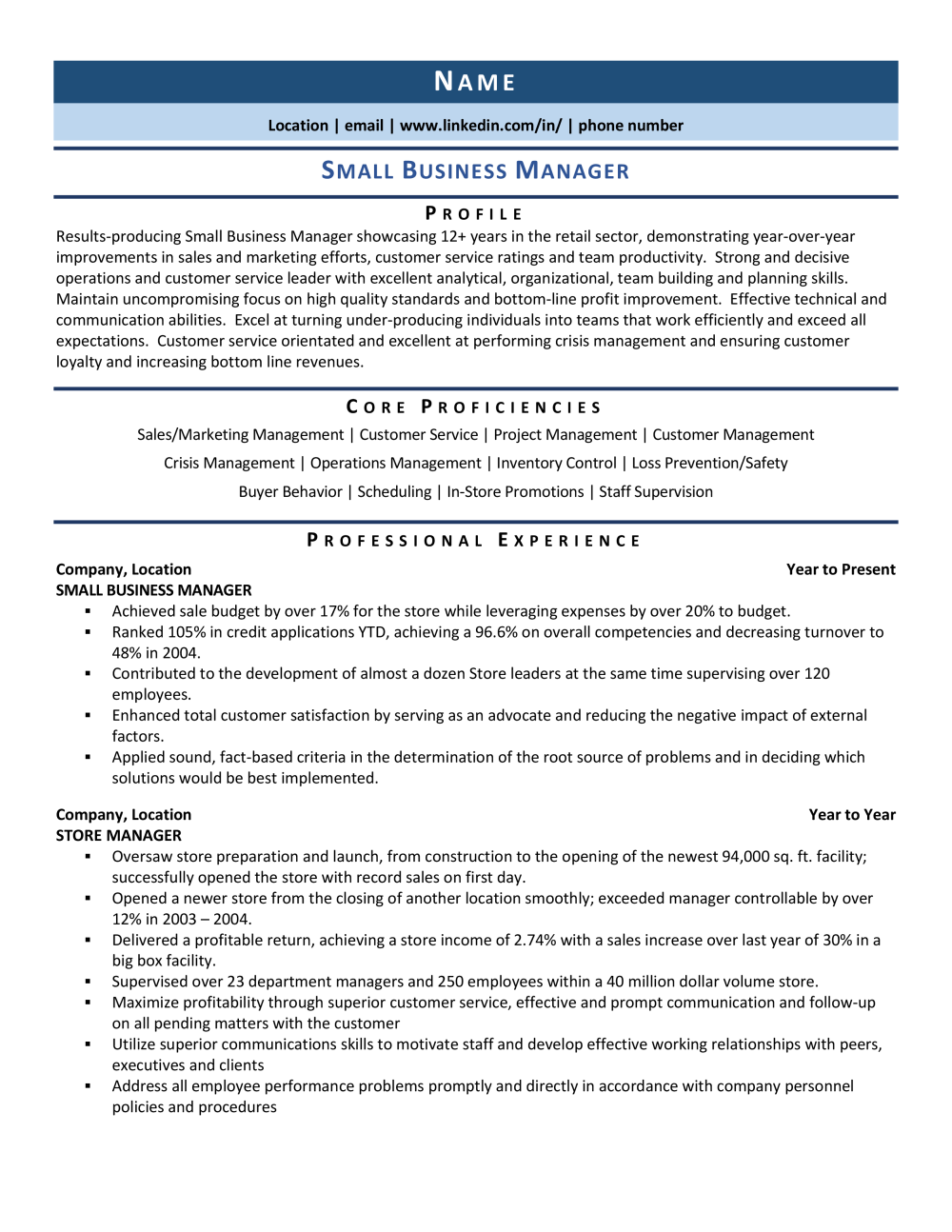
Your resume's title — distinct from your work experience job titles — should use whatever title you held: co-founder, CEO, president, or founder. If you didn't have a formal title, you can use the most relevant title for your experience and current career target.
Including your startup, self-employment, or small business on a cover letter
It's really hard to emphasize your enthusiasm to join a company after a failed startup on your resume. This is why a cover letter is a great place to state your case. You can use this space to explain what happened to your startup and what you learned along the way.
The hiring manager will be questioning how long it will be until you want to launch another startup. Take this opportunity to put their mind at rest. You don’t want to look unstable. If the reader thinks you’re a flight risk, for example, they are likely to overlook your resume.
Of course, you can better explain yourself at an interview. However, you need to win over the hiring manager in your cover letter. You want to emphasize that you want to stay and grow with the company for the long term. There are some points you should include on the cover letter which will help lead to the interview.So, you should emphasize these two points on a cover letter:
The fact that you're excited for the opportunity to work for the company and be part of a team
Your skills and knowledge gained from your startup are relevant and perfect for the position
Here is an example:
After working on my startup XYZ for the past 2 years, I've gained a deep knowledge of marketing, customer acquisition and sales. I'm very enthusiastic about joining [company name] where I'm confident that my skills and knowledge will help grow the company for the long term. I feel my experience fits in perfectly with the position open and would be grateful for the opportunity to interview.
Should you mention why the startup or business failed?
Answer: Only if it was acquired.
If your startup failed for other reasons, it's best to leave it that part off your resume. As we have mentioned, the hiring manager won’t be surprised that a startup failed and it doesn’t have to be negative. However, you don’t need to highlight the reasons on your resume. Still, you should come up with a solid answer if they ask you why it failed at the interview.
Final words
Ready to get started and work on your startup resume? In this guide, we have given you the tools that you need to succeed. Follow our advice on when you should include this experience in your application and how to position your experience correctly. Remember, the aim of the game is always to boost your chances of landing that all-important interview.
Looking for a new job? If you want to climb the career ladder, check out our free resume review tool now. Get the insights you need to beat the competition!
Recommended reading:
How To Write A Resume After Being An Entrepreneur (+ Example)
Chief Executive Officer (CEO) Resume Example
Entrepreneur Resume Example & Guide
Charlotte Grainger, Editor & Content Writer, Charlotte Grainger, Editor & Content Writer
Charlotte Grainger is a freelance writer living and working in Sheffield, UK. She has a passion for career development and loves sharing tips and advice. Follow her on Twitter

Our resume services get results.
We’ve helped change over 30,000 careers.
Get a free resume review today
Our experts will review your resume’s grammar, layout, and ability to pass ATS — all free and delivered straight to your inbox.
PROTECT YOUR DATA
This site uses cookies and related technologies for site operation, and analytics as described in our Privacy Policy. You may choose to consent to our use of these technologies, reject non-essential technologies, or further manage your preferences.








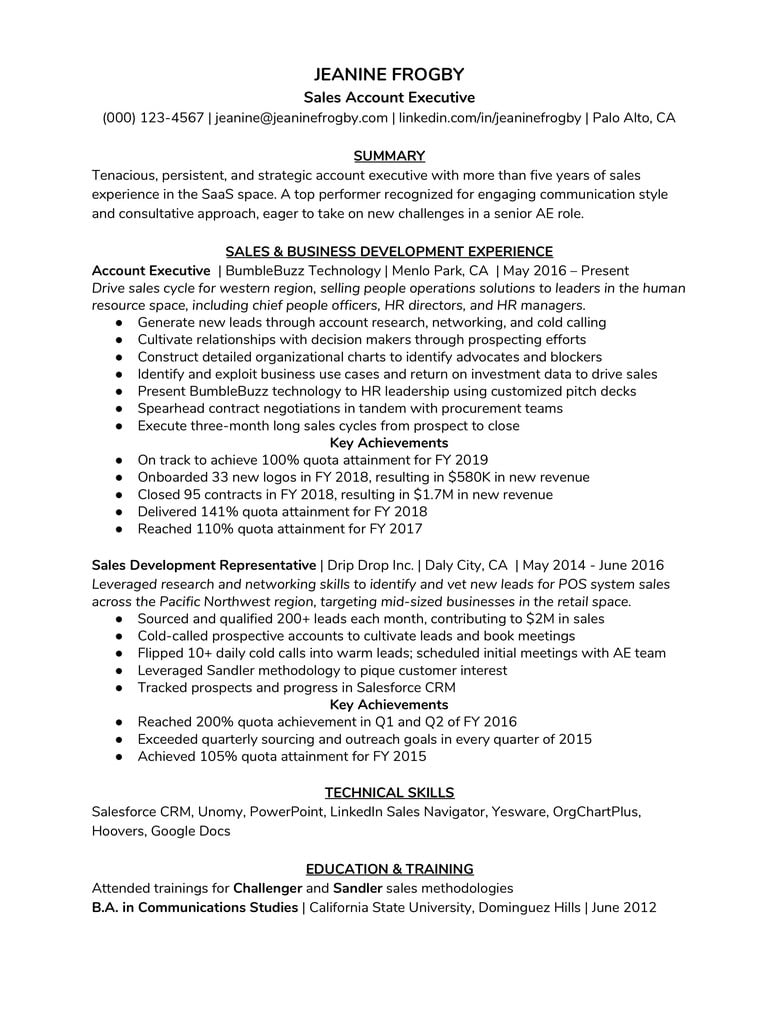


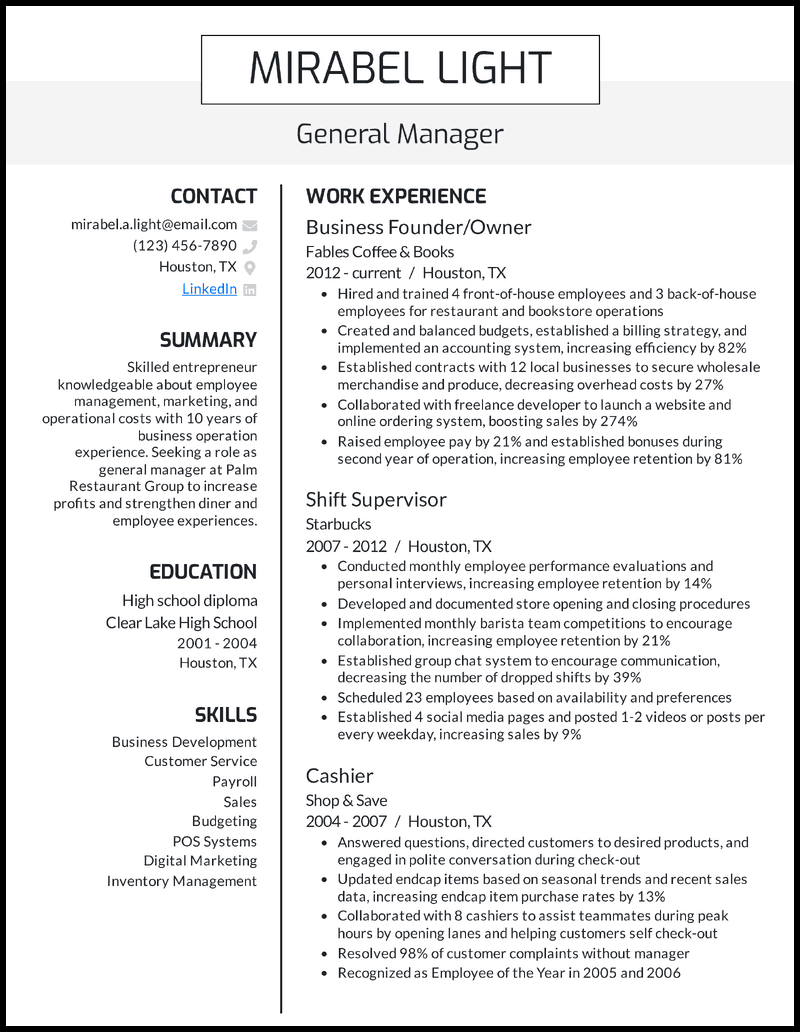

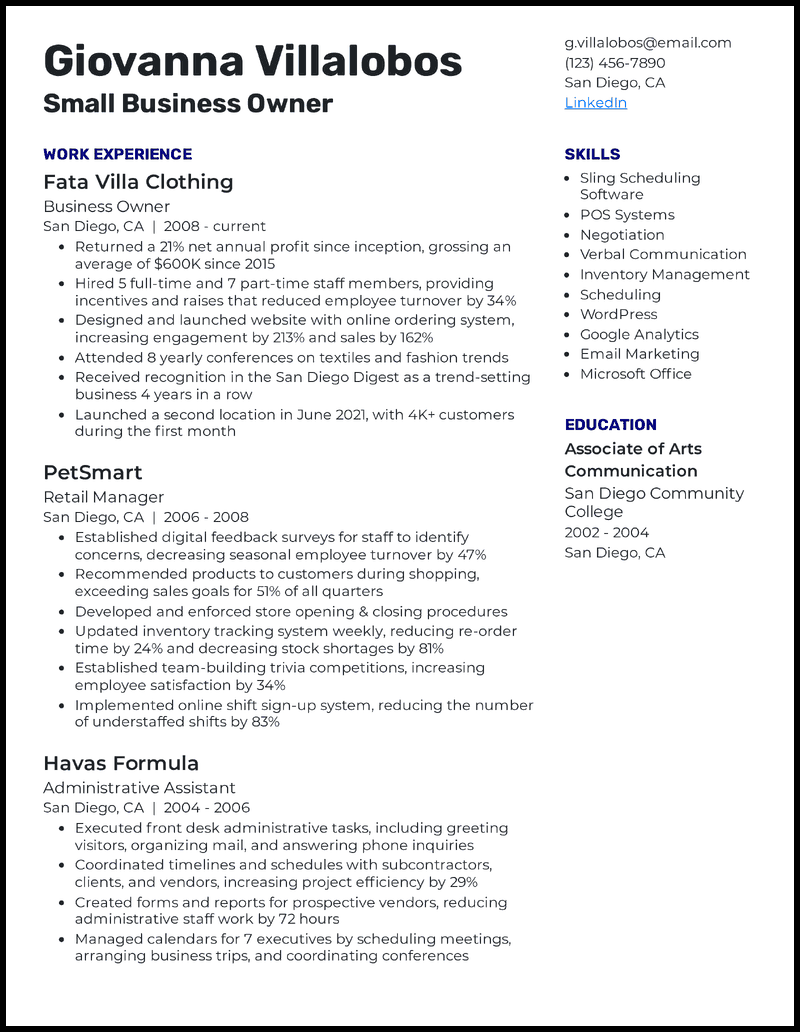
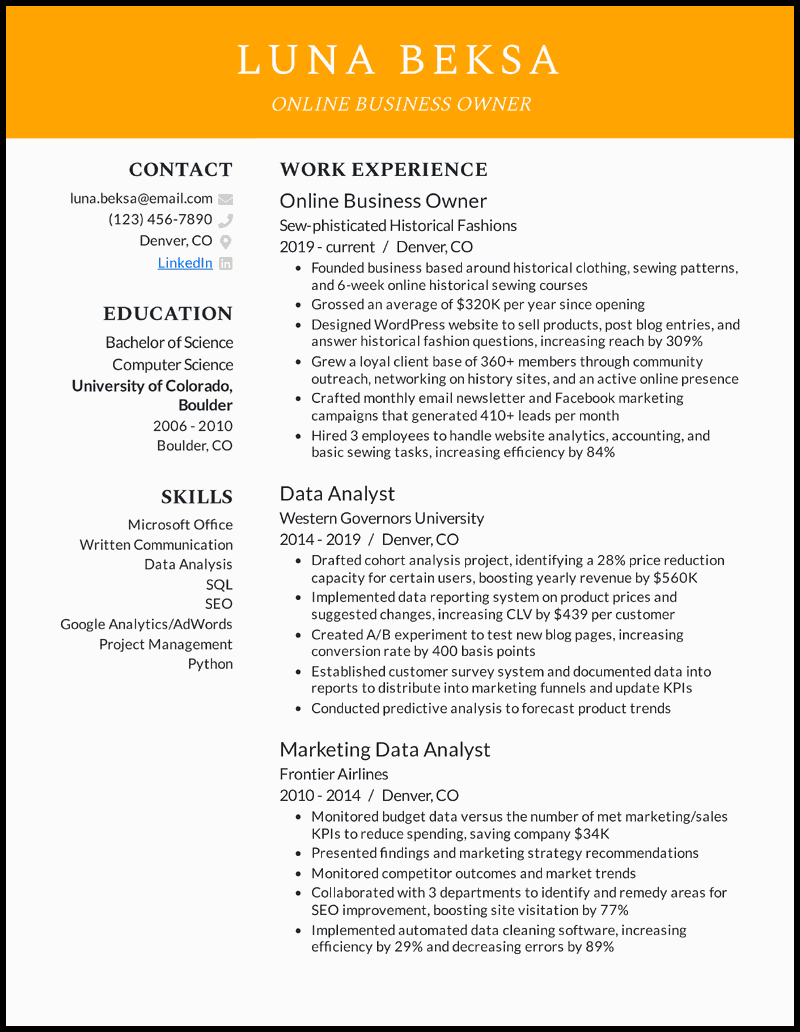


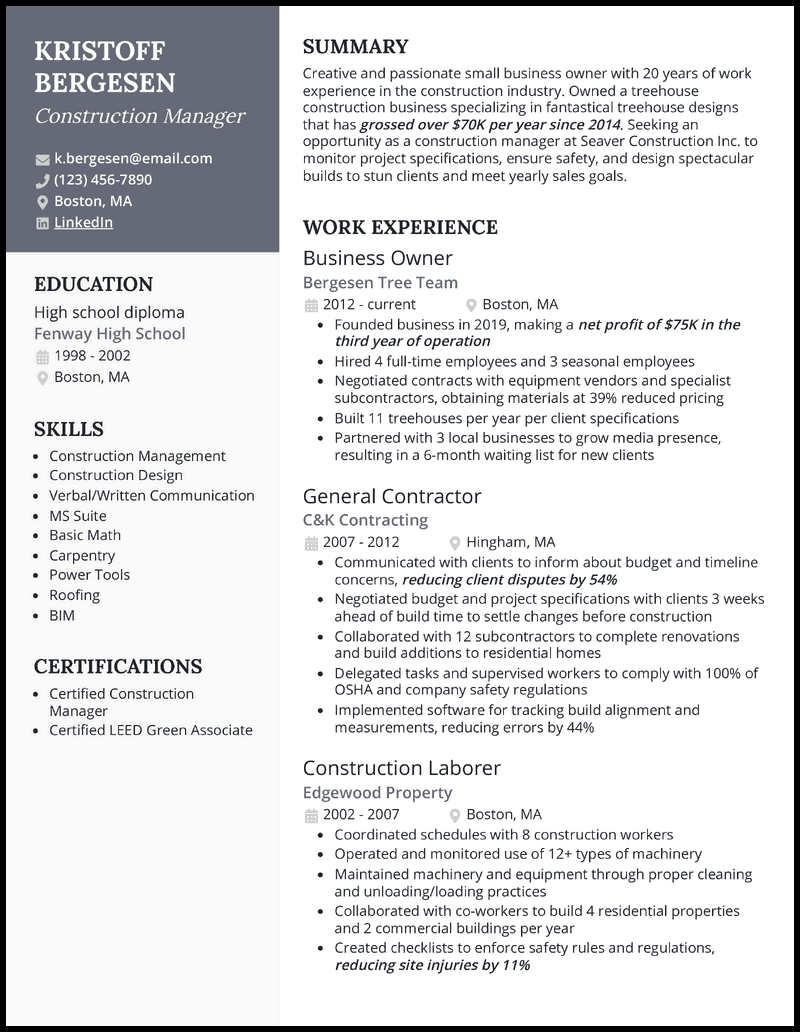










COMMENTS
By consolidating your job titles, you'll avoid giving the impression you're a job-hopper. Example 1: Provide one company heading. List your newest employer first. COMPANY A (merged with Company B in August 2011) COMPANY A (acquired Company B in August 2011) COMPANY A (formerly Company B) Example 2: Show a series of positions by stacking your ...
Put the job on your resume with your start and end dates, and if they ask why you left your job, you say it's because the company went under. Unless it's your fault the company folded, I would still put it on my resume. I was laid off from a job when the company ran out of money and couldn't afford to pay me anymore.
In this case you should describe your position in the company, and below add your former manager's contact details. For the second company, again thoses cases exist, but if you know the phone number is obsolete you shouldn't put it. Instead, you could add the personal contact for your former manager at this position too.
To list your previous employer on a job application, follow the same format provided on the job application for other prior work experience. Include job title, company name, dates worked, job responsibilities and salary, if applicable. After providing that information, write "no longer in business," "ceased operations," or "defunct.".
What to Write. When a job application has a space that asks your reason for leaving, the best response is to simply write "company closed" if that's the case. You don't need to go into any greater detail such as explaining why the company closed. This simple explanation shows the potential employer that you lost your job through no fault of ...
Closed 9 years ago. I'm working on updating my resume and came across this issue. The company I work at was bought out almost a year ago, while I continued working there during that time. ... I say put this at the end, because it doesn't need to pollute the basic information of the employment dates, job title, and company name that should ...
To contact the Small Business Administration by mail, write to: U.S. Small Business Administration, 409 3rd St. SW, Washington, DC 20416. Or call: SBA Answer Desk: 800-827-5722. Or you can email them at [email protected]. You can reach the Better Business Bureau by typing your city and state or your ZIP code into the "Locate" box in the ...
Samantha Nolan is an Advanced Personal Branding Strategist and Career Expert, founder and CEO of Nolan Branding. Do you have a resume, career, or job search question for Dear Sam? Reach Samantha ...
Here are the steps you can follow to write about being laid off on a resume: 1. Research resume trends. Research popular resume trends, especially if you haven't applied for a new job in some time. Learn about what employers want to see on resumes and review different resume samples and templates.
Some local and national business databases are free to the public via the Internet or using public library resources. You may have to contact the national or regional human resources department of a former employer that closed down locally, asking how you should correctly list the location on the resume document.
Including your startup or business on a resume would be very similar to the way you would include any other work experience. Follow these steps when including a startup in your work experience: 1. Start with the basics. Include the name of your company and the dates you worked on it. Include your role within this business.
Make sure that you have a reference from your last job. Other than that, you're fine. Companies go under all the time. It's unrealistic to expect current contact information from someone you worked with 15 years ago. You don't have to put that the business closed on your resume.
If you do decide to discuss your layoff in a cover letter, keep it brief. A short, terse explanation such as "my department was cut from the company" or "25% of my department was laid off" will more than suffice. If only your position was eliminated, you could note that by saying, "budgetary cuts led to my position being eliminated.".
Right now, my resume looks bad in terms of jumping jobs. First job out of college was an on-call assistant, 10 months later jumped to a part-time in communications (my major), and 11 months after that, jumped to current full time-position, where I thought I would be for at least 2 years.
Closing skills: key takeaways for your resume. Take action: demonstrate your expertise by choosing action verbs over passive constructions. Use all parts of your resume: showcase your strong closing skills in all parts of your resume. Don't just list 'closing skills' in the skills section.
Explain that you closed your business once you determined your preference is to work in an environment where you are part of a team and not the sole contributor. Tell the hiring manager that before starting your own business, you worked as an employee and a team player. However, during the course of your entrepreneurial pursuit, you realized ...
A family business is a business that is owned by a family and is usually smaller scale and family-oriented. For resume purposes, this means it is a business owned by members of your own family. This could include your immediate family, or even distant relatives. The idea is that a family business may give you opportunities because you are ...
Create scannable sections. Organizing your resume into clear, easy-to-identify sections (like sales experience, education, and technical skills) will make it much easier for recruiters to read. They're busy, so scannability is key. Even better, it'll help your dazzling achievements stand out. Write vibrant bullet points.
Include your company name or type of self-employment. When you fill out the company name on your resume, you have several options (even as a freelance writer ): List your company's name (for example, if you registered one for tax purposes) Write Self-Employed, Freelancer, or Contractor. If you did the bulk of your projects for one company ...
How to end a resume. The following steps can help guide you when deciding on how to end a resume: 1. Conclude the final entry of your work experience. When applying to prospective roles, some key sections in your resume that the hiring manager expects to see include your educational background and work experience.
If you have been fired, laid off or quit a job before; your prospective employer can still call and ask them if you did in fact work there. Your previous employer can legally provide information on: 1. Corroboration of your resume (did you in fact work there). 2. Your position in the company. 3. The dates of employment.
Include an objective or a summary. Discuss your work experience. Summarize your self-employment history. Highlight your key accomplishments and responsibilities. Mention your academic achievements. State the certifications you hold. List your technical and soft skills. Include client references. 1.
Examples That Worked in 2024. Stephen Greet June 21, 2024. 1. Construction Business Owner. Business Owner. Self-Employed Business Owner. Small Business Owner. Online Business Owner. Cleaning Business Owner.
The union said the negotiations continued into Sunday morning and would resume on Monday. Bombardier said it was continuing to negotiate and hoped to "swiftly reach a mutually beneficial ...
They lay out three principles for navigating the rising number of economic risks: (1) Don't put too much stock in any one economic model. (2) Ignore the doomsayers in the financial press.
To overcome this, the authors offer three recommendations for lead founders and cofounders alike: 1) Put yourself in the other person's shoes, 2) Don't neglect the interpersonal aspect in ...
Proposed changes to the way in which trans people would change gender under Labour are put to him. This includes making it easier to get a gender recognition certificate - see more in our 6.47am post.